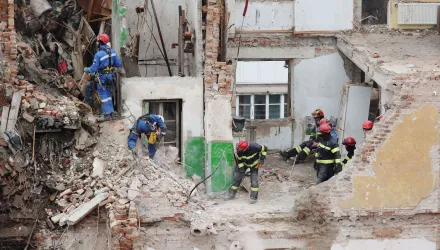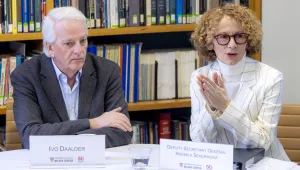The recent overthrow of Bashar al-Assad’s government in Syria has introduced significant shifts in the geopolitical landscape, reverberating far beyond the Middle East. For Russia, a staunch ally of the Assad regime since 2015, this development marks a severe setback to its regional influence. As Russia finds itself embroiled in simultaneous crises—its waning influence in the Middle East and an ongoing war in Ukraine—the fall of Assad signals more than a localized defeat. It represents a critical inflection point in global power dynamics, with far-reaching consequences for regional stability, domestic politics, and Russia's global standing. To understand whether Syria's developments have bearing on Russia, one must consider the implications for Moscow’s geopolitical ambitions, its military infrastructure, and its capacity to sustain influence in multiple regions. While some may argue that Russia’s adaptability could mitigate these losses, closer examination reveals that Syria’s fall has exacerbated challenges that Moscow cannot easily overcome.
Geopolitical Setback:
Russia’s intervention in Syria was a cornerstone of its strategy to reassert its global influence. By propping up Assad’s regime through airstrikes and ground support, Russia sought to position itself as a decisive power broker in the Middle East. The collapse of the Assad government now deals a heavy blow to this narrative, undermining Moscow’s credibility as a reliable ally. Moreover, this development weakens Russia’s ability to shape outcomes in the region and diminishes its standing in the global geopolitical order. While Moscow has long sought to counter U.S. influence, the erosion of its Middle Eastern foothold complicates its broader vision of a multipolar world. Some may argue that Russia could pivot to strengthen ties with other allies, such as Iran or Turkey, to compensate for this loss. However, these alliances are fraught with competing interests, making it difficult for Russia to maintain a unified strategy in the region.
Threat to Military Assets:
Russia’s military investments in Syria, including its Hmeimim airbase and Tartous naval base, are now under threat from advancing insurgent forces. They are both important to Russia’s strategic presence in the eastern Mediterranean and also to Russia’s power projection into North Africa (Libya, the Sahel, Sudan). However, they are increasingly vulnerable as Moscow struggles to allocate resources between Syria and Ukraine. The parallels with America’s chaotic withdrawal from Vietnam in 1975 are stark, threatening to inflict reputational damage and compromise Russia’s strategic foothold in the region. If Moscow is forced to withdraw from these bases under duress, it risks a "Saigon moment" that could further erode its global prestige. Some might suggest that Russia could redeploy forces or bolster defenses to secure these assets. Yet, with its military already overstretched—Russia is trimming its military forces farther abroad, given the strains produced by it aggression in Ukraine, both bases are under-manned as forces have been shifted to Ukraine—such maneuvers are unlikely to be sustainable in the long term.
Resource Strain:
Simultaneously managing the war in Ukraine and the fallout in Syria has overextended Russia’s military capabilities. The strain of engaging in two high-stakes conflicts has exposed the limits of Moscow’s ability to sustain its global ambitions. This overextension complicates Russia’s strategic objectives and forces the Kremlin to make difficult trade-offs, potentially weakening its position in multiple theaters. This resource strain is not just a matter of military logistics; it has significant domestic implications as well. As economic pressures mount from sanctions and prolonged conflict, the Russian public may grow increasingly critical of the Kremlin’s foreign entanglements. While Putin’s hold on Russia remains formidable and his regime's control tight, sustained resource strain and rising discontent could challenge the regime's ability to maintain its prestige and manage internal stability, which may still constrain Moscow’s capacity to project power abroad
The fall of Assad signals more than just a regional setback; it highlights the fragility of Russia’s broader strategy to sustain influence globally. China’s growing interest in the Middle East, for example, could create additional challenges for Moscow, as Beijing’s diplomatic and economic clout offers an alternative to Russian influence in the region. The same goes for growing Chinese involvement in the South Caucasus and Central Asia.
Concluding Remarks:
The question of whether what happened in Syria has any bearing on Russia can now be answered definitively: the fall of Assad represents a pivotal moment that exposes significant vulnerabilities in Moscow’s global strategy. Geopolitical setbacks, threats to military assets, resource strain, and long-term consequences for global power dynamics all point to an enduring impact on Russia’s standing. While Russia may attempt to adapt by shoring up alliances or redirecting resources, the cumulative effect of these challenges suggests that Syria’s fall is not merely a localized defeat but a symptom of deeper limitations in Russia’s ability to sustain its ambitions. In this sense, the developments in Syria are not just relevant to Russia—they may be transformative, reshaping its role on the world stage.
Statements and views expressed in this commentary are solely those of the author and do not imply endorsement by Harvard University, the Harvard Kennedy School, or the Belfer Center for Science and International Affairs.








